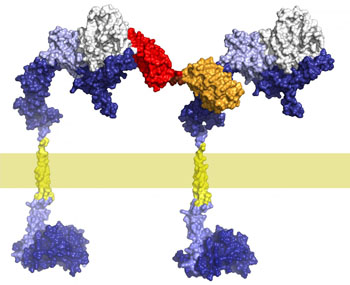A team of Swiss drug developers has designed a novel drug that cures breast cancer by completely blocking the activity of the surface receptor HER2 (human epidermal growth factor receptor 2).
Current antibody-based drugs for the treatment of breast cancer such as trastuzumab and pertuzumab slow tumor growth without destroying the cancer cells. While the drugs block some HER2 activity, the receptor is able to access several signaling pathways at the same time. The drugs block only one of these pathways, while the others remain active.
To solve this problem, investigators at the University of Zurich (Switzerland) designed a protein compound capable of binding simultaneously to two HER2 receptors in a targeted manner. This attachment changed the spatial structure of the receptors and prevented growth signals from being transmitted into the cell interior, resulting in death of the cancer cells.
The new drug was a result of advances in DARPin (designed ankyrin repeat proteins) technology. DARPins are genetically engineered antibody mimetic proteins typically exhibiting highly specific and high-affinity target protein binding. They are derived from natural ankyrin repeat proteins. Repeat proteins are among the most common classes of binding proteins in nature, responsible for diverse functions such as cell signaling and receptor binding. DARPins constitute a new class of potent, specific, and versatile small-protein therapies, and are used as investigational tools in various therapeutic and diagnostic applications.
The investigators reported in the June 3, 2016, online edition of the journal Nature Communications that their DARPin drug not only selectively killed HER2-positive breast cancer cells; it did so without harming normal cells in the body.
“It is this [RAS] protein that is responsible for reactivating the growth signal emitted by the HER2 receptor. The antibodies lose effect and the cancer cells continue to proliferate,” said senior author Dr. Andreas Plückthun, professor of biochemistry at the University of Zurich. “Now that we have identified the Achilles heel of HER2-positive cancer cells, new opportunities are opening up for treating invasive tumor types like breast cancer more effectively in the future”.
The future potential of DARPin technology is being evaluated by the biotechnology firm Molecular Partners (Zurich, Switzerland), a spin-off company of the University of Zurich.







